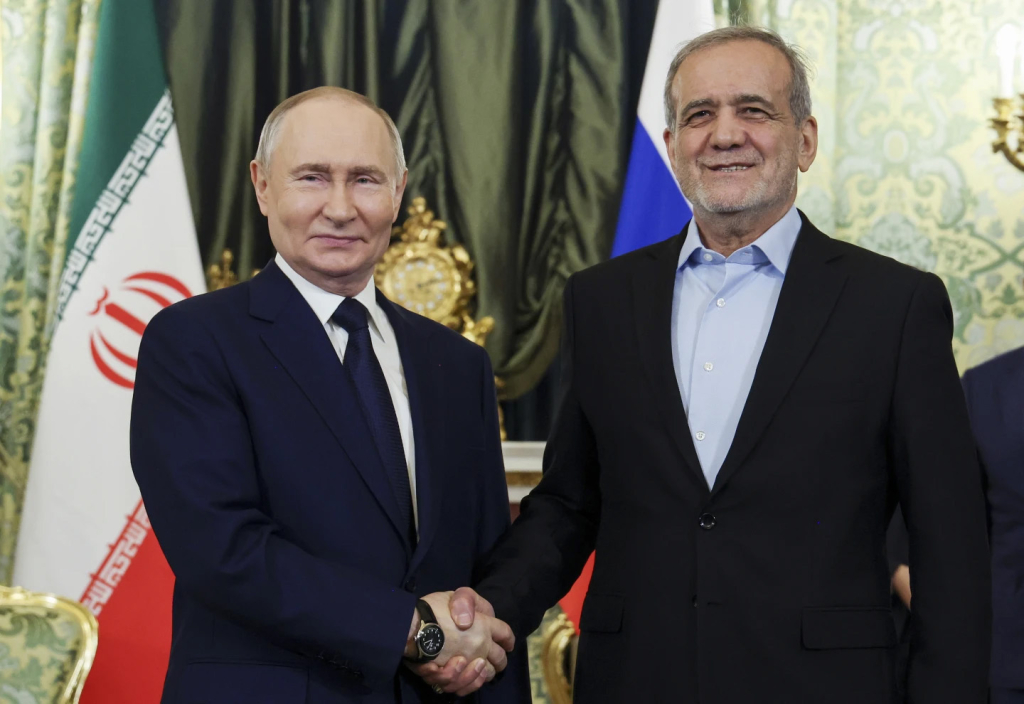
PHOTO COURTESY OF AP
MOSCOW — Russian President Vladimir Putin and Iranian Vice President Masoud Pezeshkian signed a wide-ranging cooperation agreement on Friday, deepening the partnership between their countries in response to escalating Western sanctions.
The new agreement, labeled a “comprehensive strategic partnership treaty,” covers a range of areas, including trade, military cooperation, science, education, and culture, according to officials from both nations.
Putin hailed the deal as a “real breakthrough” that would foster long-term stability and growth not only for Russia and Iran but also for the broader region. He noted that while trade and economic relations between the two countries are currently insufficient, the treaty would serve as a catalyst to expand these areas. Putin expressed hope that it would help overcome existing technical hurdles related to projects aimed at transporting Russian natural gas to Iran and developing new transport corridors to Iranian ports in the Gulf.
Pezeshkian, for his part, affirmed that these projects were feasible, with experts actively working to address the remaining challenges.
His visit comes just days before the inauguration of U.S. President-elect Donald Trump, who has pledged to take a firmer stance on Iran and broker peace in Ukraine. Iran is also grappling with mounting economic difficulties and military setbacks in the Middle East, particularly in Syria and Iraq.
Kremlin spokesman Dmitry Peskov dismissed any connection between the signing and Trump’s inauguration, stating that the agreement had been planned well in advance.
In his remarks welcoming Pezeshkian, Putin emphasized that the new treaty would “give an additional impulse” to the growing partnership between the two nations. Pezeshkian, who has met with Putin three times since taking office in July, called the agreement a “solid foundation” for future collaboration, adding that Iran considers its relationship with Russia “vital, sensitive, and strategic.”
The Iranian vice president also touched on broader regional issues, saying that countries in the region should resolve their own conflicts without outside intervention. He alluded to U.S. involvement in the region, claiming that foreign forces only exacerbated tensions. “They come from another side of the world to create chaos in the region,” he said. “These ties will defuse their plot, definitely.”
Since Russia’s military intervention in Ukraine in February 2022, Moscow and Tehran’s alliance has strengthened. Western and Ukrainian officials have accused Iran of supplying Moscow with drones used in attacks on Ukraine, a claim both countries have denied.
In 2023, Iran joined the BRICS bloc of developing economies, with Pezeshkian attending the summit hosted by Russia in Kazan. Russia and Iran have had a historically complex relationship, but since the collapse of the Soviet Union in 1991, Russia has become a key partner in trade, weapons, and technology for Iran, which has been burdened by international sanctions.
Russia has also played a central role in Iran’s nuclear program, building the country’s first nuclear plant, which began operations in 2013, and is constructing two additional reactors. Moscow was a signatory to the 2015 nuclear deal between Iran and six world powers, which provided Tehran with sanctions relief in exchange for curbing its nuclear program. When the U.S. withdrew from the agreement during Trump’s first term, Russia supported Iran diplomatically.
The two nations have also collaborated extensively in Syria, where they supported the regime of Bashar al-Assad during the civil war. However, the recent fall of Assad’s government has been a blow to Iran’s so-called “Axis of Resistance” in the region, which also includes militant groups like Hamas in Gaza and Hezbollah in Lebanon—both of which have faced Israeli offensives.
Tehran is increasingly relying on Moscow as it faces significant economic challenges and setbacks in its Middle East influence. The relationship could become even more crucial if Trump returns to the White House and re-implements his “maximum pressure” campaign against Iran. In particular, Iran is seeking advanced Russian military technology, including long-range air defense systems and fighter jets, to counter potential Israeli strikes.







